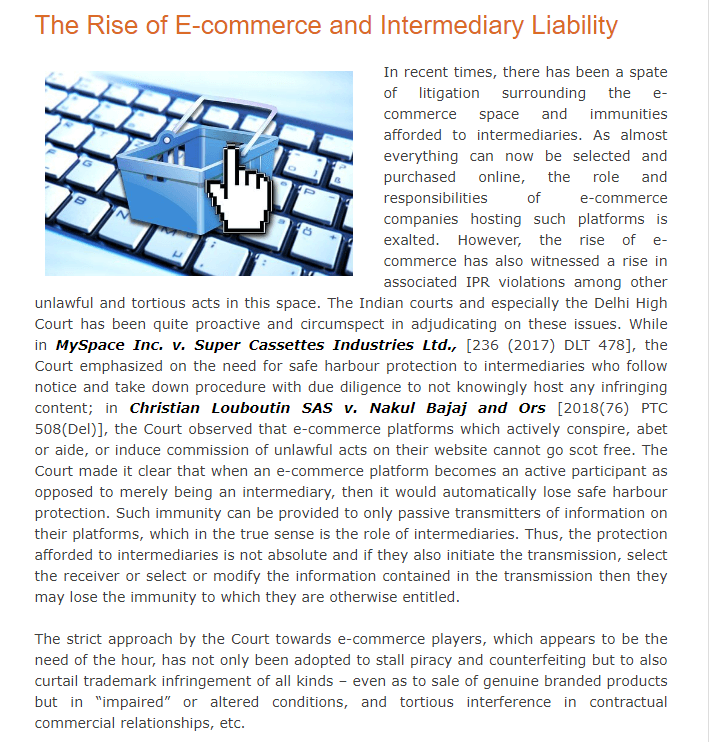The consumer affairs ministry is working on tightening ecommerce rules to make online retail platforms liable for fraud committed by sellers and attaching “fallback liability” to their role as intermediaries. This is as per a report by the Economic Times. Other sources are Lexology, Lexorbis & NIC.
***********
‘Fall-back liability’ under the Consumer Protection (e-Commerce) Rules, 2020
Introduction:
It is no surprise that within a short span of time e-commerce has had a tremendous impact on consumers all over the world. Such dramatic change in the current environment for both businesses and consumers has also posed new challenges, which made it imperative to bring a codified legislation to cater to the interests of the consumers of the e-commerce space.
In a bid to prioritize and safeguard the interests of the consumers against the possible exploitation by e-commerce entities, the Ministry of Consumer Affairs, Food and Public Distribution, Government of India, in exercise of its powers conferred under the Consumer Protection Act, 2019 (‘Act’), notified and made effective the provisions of the Consumer Protection (E-Commerce) Rules, 2020 (‘E-Commerce Rules’ or ‘Rules’) from 24 July 2020. These Rules are intended to regulate an ‘e-commerce entity’, which is broadly defined to mean any person who owns, operates, or manages a digital or electronic facility or platform for e-commerce. These Rules also define an ‘inventory-based e-commerce entity’ as an entity which owns the inventory of goods or services and sells such goods or services directly to the customers.
Additionally, the Government of India, on 21 June 2021, has proposed certain amendments to the E-commerce Rules and received comments or suggestions from the stakeholders in the industry to such amendments. The proposed amendments, once notified, will not only impact the e-commerce operators (both marketplace as well as inventory-based model entities) but also entities (such as sellers, distributors and logistics partners) which are engaged by such operators, in fulfilment of orders placed by buyers on an electronic portal or mobile based application.
The objective of the proposed amendments is to regulate and deter predatory and unethical e-commerce practices, which includes fraudulent flash sales and mis-selling or misrepresentation of goods and services. Another key amendment is in relation to the appointment of grievance redressal mechanisms and increasing the liability of e-commerce entities.
Applicability:
The E-Commerce Rules apply to all e-commerce entities involving goods or services, including e-commerce entities which are not established in India but systematically offer goods or services to consumers in India.
Further, the E-Commerce Rules also prescribe: (a) liabilities of marketplace e-commerce entities; (b) duties of sellers on marketplace platform; and (c) duties and liabilities of inventory e-commerce entities (including single brand and multi-channel single brand retailers).
Fall-back liability clause – Increasing the liability and responsibility of marketplace entities:
Apart from the enormous impact that the Rules may have on the marketplace entities, the issue that begs our attention is the inclusion of the “fall-back liability” clause. E-commerce Rules define fall-back liability as ‘the liability of the marketplace e-commerce entity where a seller registered with such entity fails to deliver the goods or services ordered by a consumer due to negligent conduct, omission or commission of any act by such seller in fulfilling the duties and liabilities in the manner as prescribed by the marketplace e-commerce entity which causes loss to the consumer.’
In other words, the clause makes a paradigm shift in the liability of online retailers, who up until now majorly functioned in the nature of middlemen, but with these Rules coming into force, will become directly and vicariously responsible for the damage caused by the vendor to the customer. This implies that even, in cases of negligent conduct by the seller, the onus of liability shall fall upon the e-commerce entity, if any losses are incurred by the end consumers. Additionally, this clause also holds the e-commerce entity liable for any default on the part of logistics service provider, i.e., if there is a failure of delivery of goods and services, the liability shall be on the e-commerce platform itself. This has been criticised by many stakeholders as grossly unfair to e-retailers.
Judicial position relating to vicarious liability in India:
Various consumer complaints have been filed before the consumer forums in the past, claiming liabilities against the e-commerce entities. One such order was recently passed by the Chhattisgarh State Consumer Redressal Commission (‘Commission’), where Amazon Seller Services Private Limited (‘Amazon India’) was absolved from its liabilities as against the other respondents.
The complaint was filed regarding the deficiency in services and breach of warranty conditions, where Amazon India argued that it is only a facilitator, and that at the time of registration on the website, the complainant had accepted the “Conditions of Use” which categorically provided that the contract of sale and purchase of items was strictly a bipartite contract between a registered seller and customer. It was further argued that, as per the conditions of sale, there is no privity of contract between Amazon India and the buyer, and therefore it cannot be held negligent for conduct of other parties. While absolving Amazon India, the Commission observed that Amazon India was merely acting as a shopping platform and has no connection with manufacturing, repairing or any other services in relation to the product. It was further observed that unless the person who visits the site agrees to the terms and conditions of the website, the transaction cannot proceed.
Although, the arguments made by Amazon India had merit, the position has been settled by the subsequent judgment of National Consumer Dispute Redressal Commission, in the case of Hello Travels v. Harish Jain, reaffirming its earlier position in the case of Amazon Seller Services Pvt. Ltd. v. Gopal Krishan.
In said case, through a web domain (online portal) owned, managed and controlled by Amazon India, a mobile handset Xiaomi Redmi Note 3 was purchased by Sh. Gopal Krishan on 11 May 2016. Payment was made online and the handset was found defective. In said case, it was observed that it was the duty of the facilitator to ensure that goods sold through any individual are manufactured as per the quality standard. If the goods purchased online are found not up to the mark, online portal through which goods were purchased cannot escape its liability.
*******************
Rules will be formulated after the platforms respond to queries related to the issue, sent to them by the ministry of electronics and information technology (MeitY), said the consumer ministry official.
The ecommerce rules were first put in the public domain in July 2020, when the government notified the Consumer Protection (Ecommerce) Rules, 2020, under Section 101 of the Consumer Protection Act, 2019, proposing to bar affiliated entities from selling on online platforms, as well as restricting flash sales.

MeitY’s note was prompted by questions from the Department of Consumer Affairs, which is part of the consumer ministry. Sent last week, it asked ecommerce firms to clarify their role “as an intermediary.” This is as per the ET report.
 Ecommerce platforms — or marketplaces such as Amazon, Flipkart and Snapdeal — are intermediaries that connect buyers and sellers and are protected by safe harbour provisions in Section 79 of the Information Technology Act, 2000. However, under the proposed rule changes, the government plans to change that and attach more responsibility to their role as an intermediary.
Ecommerce platforms — or marketplaces such as Amazon, Flipkart and Snapdeal — are intermediaries that connect buyers and sellers and are protected by safe harbour provisions in Section 79 of the Information Technology Act, 2000. However, under the proposed rule changes, the government plans to change that and attach more responsibility to their role as an intermediary.
“We are in the process of restructuring the ecommerce rules to ensure consumer interests are protected adequately in this emerging digital economy. We plan to make marketplaces liable if goods sold on their platforms are found to be faulty,” the official said.

Last year, the Central Consumer Protection Authority under the consumer affairs ministry imposed a penalty on several ecommerce firms for selling pressure cookers — among other products — that did not adhere to quality standards such as the mandatory ISI mark. However, some ecommerce companies argued at that time that they were only intermediaries and that the liability lay with the sellers.
 “Communications received from the Department of Consumer Affairs regarding the various challenges being faced by consumers in redressal of grievances while shopping online, particularly in case of grievances raised by consumers concerning a purchase, (where) ecommerce entity refuses to acknowledge any liability or responsibility or provide appropriate remedy to consumers, by making a reference to Section 79 of the Information Technology Act, 2000,” MeitY said in the letter to ecommerce platforms cited above.
“Communications received from the Department of Consumer Affairs regarding the various challenges being faced by consumers in redressal of grievances while shopping online, particularly in case of grievances raised by consumers concerning a purchase, (where) ecommerce entity refuses to acknowledge any liability or responsibility or provide appropriate remedy to consumers, by making a reference to Section 79 of the Information Technology Act, 2000,” MeitY said in the letter to ecommerce platforms cited above.
A Flipkart spokesperson said it has a well-defined and continuously improving programme to help customers and address their grievances. The company’s consumer grievance redressal system is integrated with that of the government, the person said.

A spokesperson for Amazon said the company has robust grievance redressal mechanisms, apart from which it is also a convergence partner for the National Consumer Helpline (NCH). “Amazon endeavours to resolve all complaints received via NCH within five days, a fraction of the permissible 45- day window,” the spokesperson said.
The ecommerce rules were first put in the public domain in July 2020, when the government notified the Consumer Protection (Ecommerce) Rules, 2020, under Section 101 of the Consumer Protection Act, 2019, proposing to bar affiliated entities from selling on online platforms, as well as restricting flash sales.
However, the rules did not find favour with top ecommerce firms. Government entities such as the corporate affairs ministry and Niti Aayog were also opposed to the proposal.